Masmouta is not just a dish; it's a culinary embodiment of heritage and a cornerstone of Eid al-Fitr celebrations in southern Iraq.
Under the scorching sun of southern Iraq, residents, particularly those in Basra, lay out fish to dry for weeks in the lead-up to Eid al-Fitr. This traditional method preserves the fish for their signature dish, Masmouta, a recipe passed through generations.
Muslims in Iraq traditionally break their Ramadan fast with light meals or sweets, but for Basrawis, the breakfast of first day of Eid al-Fitr takes a different approach.
The star ingredient of Masmouta is fish, either the river fish or sea fish, meticulously cleaned, gutted, and salted internally. Then, several fish are tied together and hung out to dry under the hot sun for two weeks. After this sun-drying process, the fish is ready to be cooked.
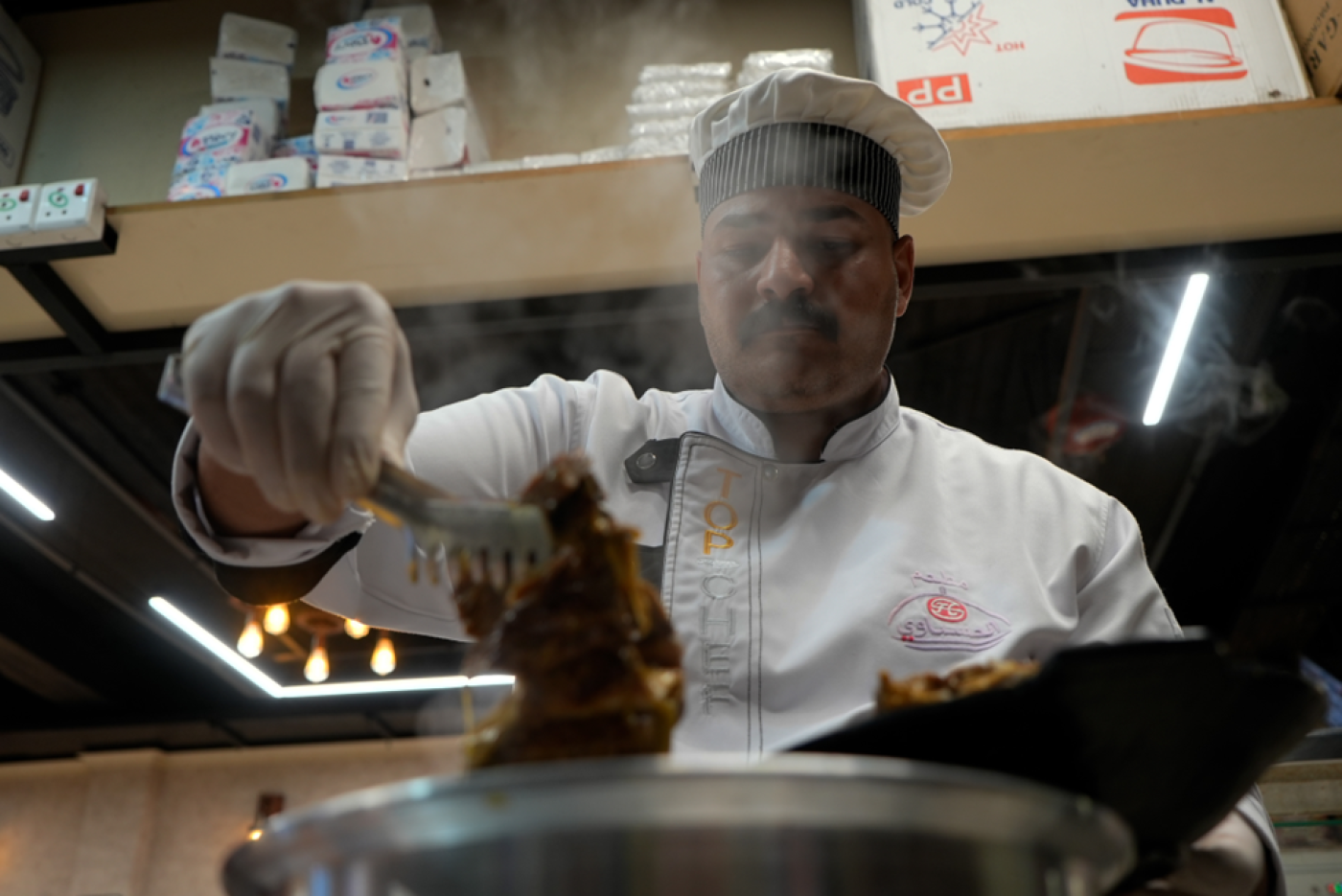 The photo shows Chef Hussein Kanwar while preparing Masmouta to serve his customers in the restaurant in Basra city. Photo: Azhar Al-Rubaie/ The New Region.
The photo shows Chef Hussein Kanwar while preparing Masmouta to serve his customers in the restaurant in Basra city. Photo: Azhar Al-Rubaie/ The New Region.
Slow cooking
To understand the intricacies of cooking Masmouta, The New Region visited Al-Hasawai restaurant to interview the Basra-based veteran Chef, Hussein Kanwar.
“First, the dried fish are rinsed to remove excess salt. Then, they [the fish] are simmered in a pot with a variety of spices, onions, tomatoes, dried lemon and garlic,” Chef Kanwar said. “Some families even add okra for an extra layer of flavor and texture, I prefer to make it with Okra, too.”
“As the pot simmers on low heat for about 40 to 45 minutes, the flavors meld, creating a fragrant and flavorful soup. I only cook it on the first day of Eid al-Fitr upon order,” he added. “People here in Basra love it so much, and I really enjoy cooking it from year to year.”
“We actually did not have Masmouta on our regular menu a few years ago, however, in the past four years, we have seen a surge in demand for this traditional dish, especially during Eid al-Fitr so we decided to offer it as a seasonal special” Kanwar said.
“We serve Masmouta alongside a refreshing side dish of onions, lemon and pickles,” he explained, and added that “seeing their faces light up when they taste that first spoonful is a reward in itself.”
Chef Kanwar concludes by mentioning a delightful tradition.
“To complete the Masmouta experience, we always offer our guests a cup of black tea after their meal,” he said. “It is almost like an unwritten rule - the perfect way to end this hearty dish.”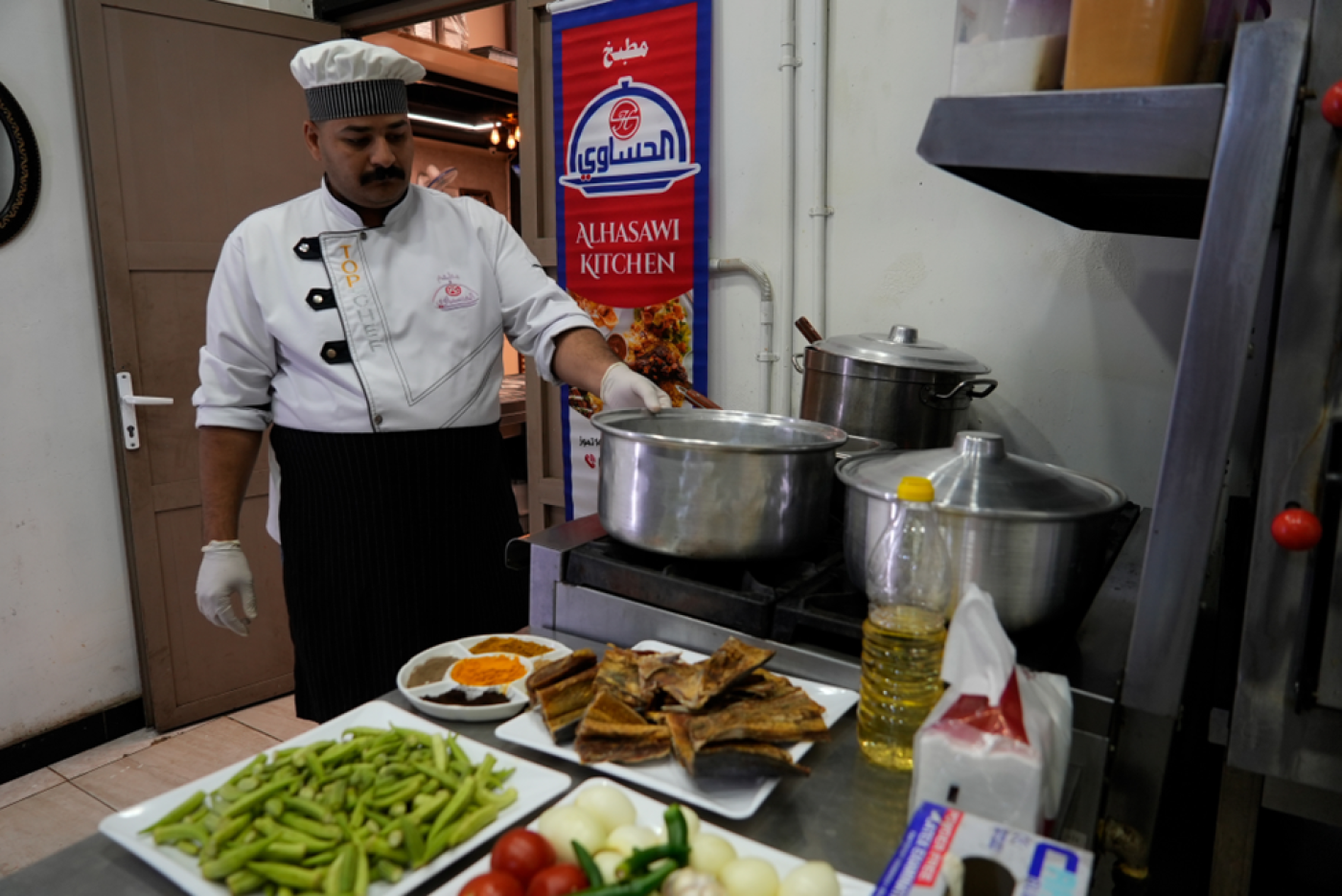 The photo shows Chef Hussein Kanwar in the kitchen to prepare Masmouta to his customers. Photo: Azhar Al-Rubaie/ The New Region
The photo shows Chef Hussein Kanwar in the kitchen to prepare Masmouta to his customers. Photo: Azhar Al-Rubaie/ The New Region
A Breakfast Debate
Generally, the first day of Eid al-Fitr in Iraq is a joyous occasion, but it also sparks a friendly debate. what to have for breakfast?
Move north to Baghdad and other Iraqi cities, and people owns a different breakfast tradition, they traditionally break their Ramadan fast with Kahi, a sweet bread often drizzled with date syrup, and Geymar, a rich clotted cream made from buffalo milk, but in southern Iraq, Masmouta is their preference.
This communal meal, shared with friends or extended family, strengthens the bonds of togetherness during Eid al-Fitr. As families gather around the table, savoring the flavors of Masmouta, they celebrate the end of Ramadan and reaffirm the importance of community.
Amer Abdul-Razzaq, a Thi Qar-based archaeological researcher told The New Region.
“Masmouta is a remarkably ancient dish from Sumer, boasts a history unearthed through excavations of Sumerian records and tablets. Images of fish adorn these tablets, hinting at a drying method long employed by ancient Iraqis to preserve food,” Abdul-Razzaq said. “Lacking modern refrigeration, drying offered a way to store fish for months or even years.”
“The abundance of rivers and waterways surrounding Iraqi cities naturally placed fish at the forefront of their cuisine. This affinity for fish seems almost ingrained, perhaps stemming from the fact that fishing has been a primary source of livelihood in southern Iraq, particularly in Basra, since the 7th millennium BC,” he added.
Even today, the tradition of eating Masmouta persists as a cherished ritual within Basra families, especially during the first day of Eid al-Fitr. “My own archaeological experiences in southern Iraq echo this deep-rooted connection to fish. Across numerous excavation sites, I've consistently encountered remnants of fish, underscoring its enduring presence in the Iraqi meal,” Abdul-Razzaq said.
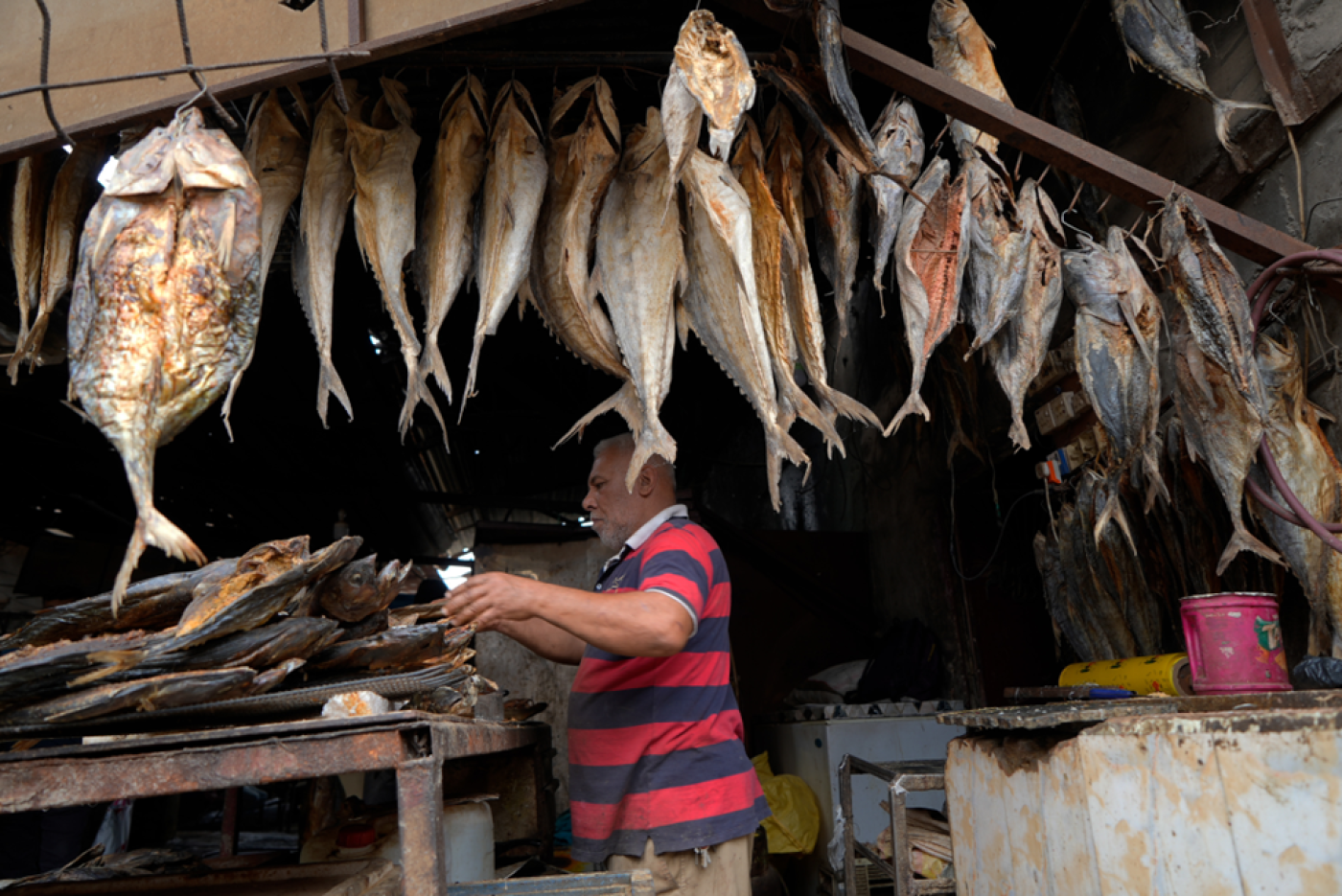 The photo shows Abu Saud selling dried fish in his shop located in Basra Old Suq. Photo: Azhar Al-Rubaie/ The New Region
The photo shows Abu Saud selling dried fish in his shop located in Basra Old Suq. Photo: Azhar Al-Rubaie/ The New Region
Nestled in the heart of Old Basra Suq, Abu Saud's fish shop brims with an abundance of glistening fish.
With Eid al-Fitr on the horizon, customers flock to his stall, renowned for the quality of his dried fish - a cornerstone ingredient in the celebratory Masmouta dish.
“Some seek the dried Euphrates carp,” explained Abu Saud, a veteran fishmonger with a knowing glint in his eye, “while others crave the bolder taste of saltwater fish. Here, I offer an endless variety to satisfy every preference.”
Cultural identity
This well-known, centuries-old dish is not just a delicious way to mark the end of Ramadan; it's believed to replenish the body after a month of fasting. More importantly, Masmouta is a shared meal. Adding to the celebratory spirit, most families in Basra traditionally eat this unique dish together.
Inside Al-Hasawi restaurant, a Basra-based native, Muammal Raed savors a plate of Masmouta.
“On the first day of Eid al-Fitr, I usually enjoy the dish with my family, brothers and relatives,” between contented bites, he said. “This year, though, I decided to experience it with friends. Luckily, I found this dish here in this restaurant - they serve Masmouta only during Eid!”
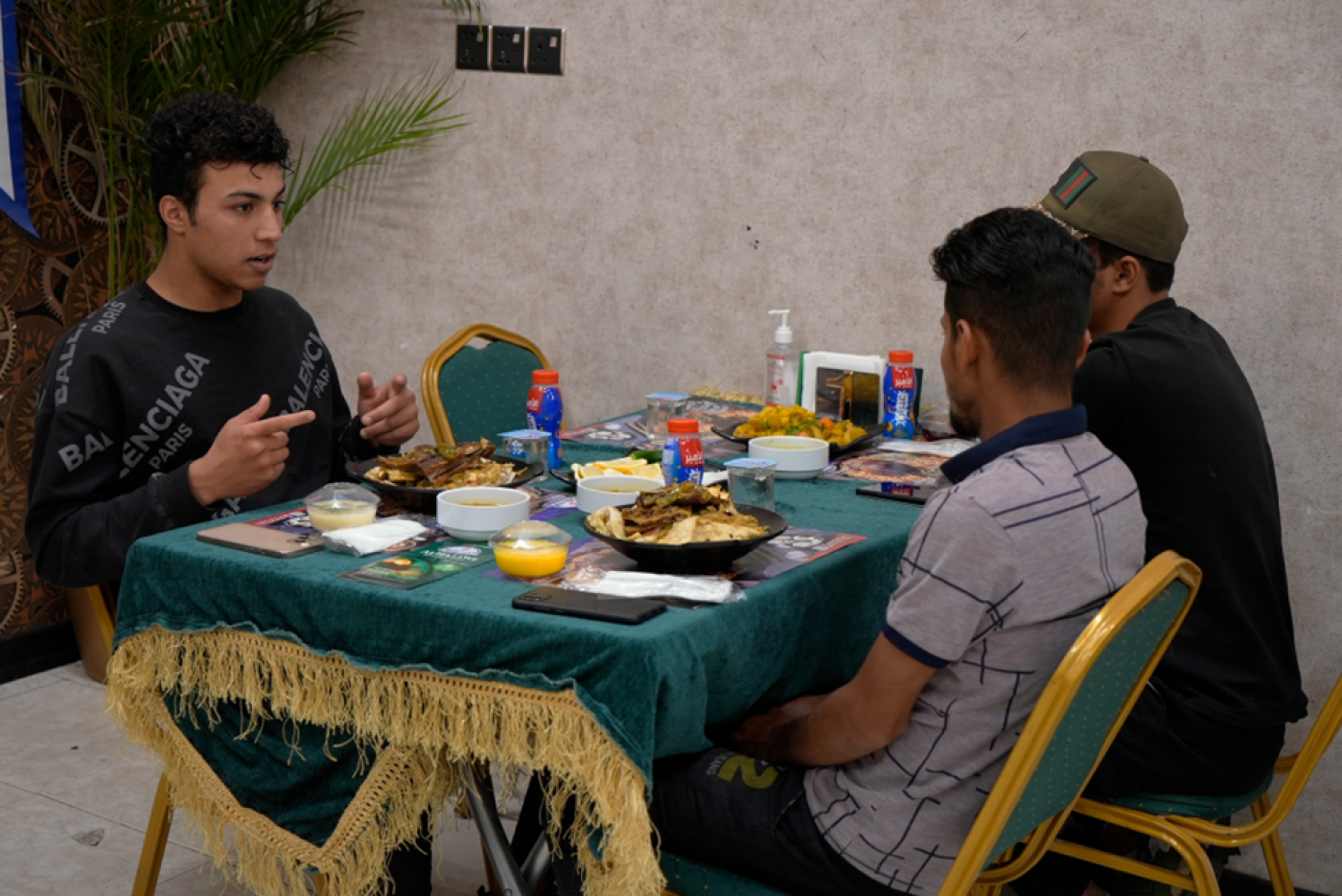 The photo shows Basra-based native, Muammal Raed while having Masmouta with his friends in Al-Hasawi restaurant in Basra city. Photo: Azhar Al-Rubaie/ The New Region
The photo shows Basra-based native, Muammal Raed while having Masmouta with his friends in Al-Hasawi restaurant in Basra city. Photo: Azhar Al-Rubaie/ The New Region
“Ever since I was a child,” he continued, “I used to see my family eat this dish every Eid. One day, I gave it a try, and I was hooked! Now, it's become a tradition for me - having Masmouta is a must-have on the first day of Eid al-Fitr.”
“Eating this unique dish feels like a genetic inheritance transmitted from our ancestors,” Raed added, highlighting the deep connection between Masmouta and his cultural identity.
More than just a dish, Masmouta serves as a culinary expression of southern Iraq's heritage and identity.
This centuries-old tradition reflects the importance Basra people place on their heritage, ensuring their unique culinary history is immortalized for generations to come.


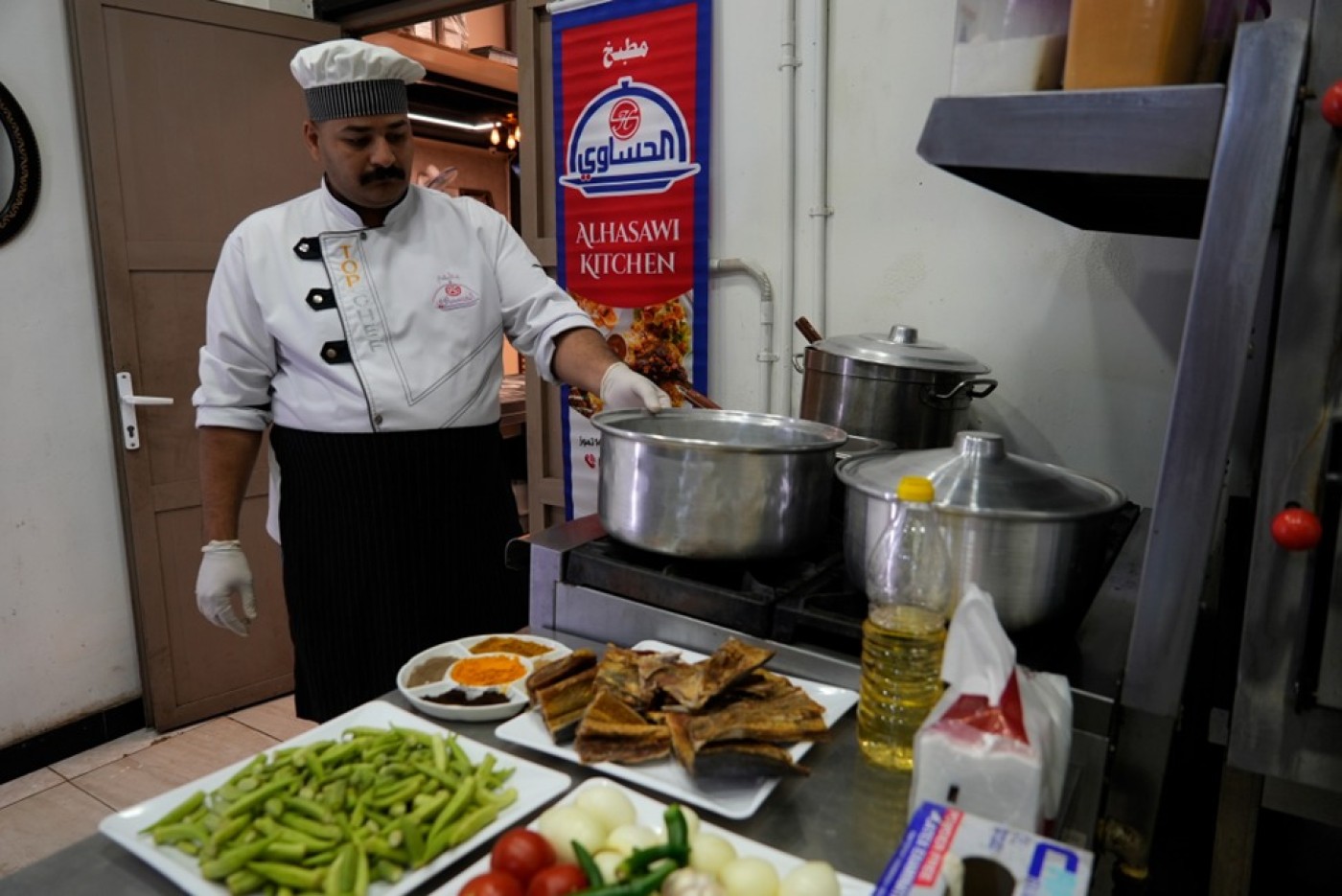
 Facebook
Facebook
 LinkedIn
LinkedIn
 Telegram
Telegram
 X
X


